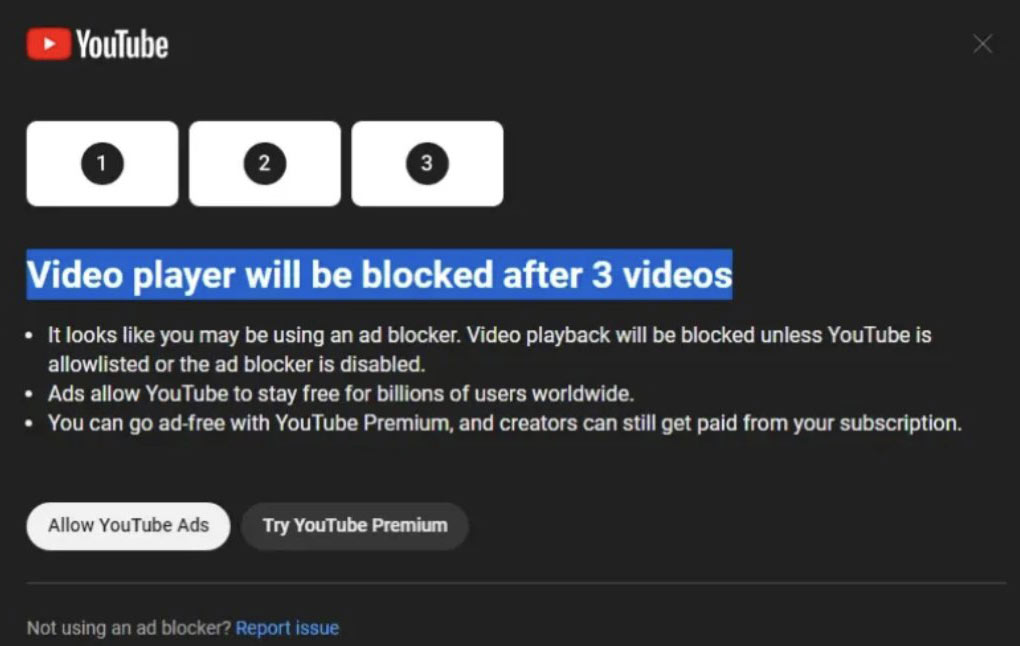YouTube May Face Criminal Complaints in EU for Using Ad-Block Detection Scripts
Privacy consultant asserts YouTube's detection script is "spyware."

A privacy consultant based in Ireland says he is in the process of filing a criminal complaint against YouTube for alleged unlawful surveillance. Specifically, Alexander Hanff’s legal action against the video streaming site is based upon YouTube’s recent controversial enthusiasm for running scripts to detect ad-blocking browser plug-ins. The Register reports that Hanff has already filed a similar complaint regarding Facebook’s collection of data without explicit consent.

The criminal complaints made by Hanff can be seen as a stern follow-up to an earlier privacy fight-back initiative. Two weeks previously he filed a civil complaint about YouTube’s browser extension snooping. However, Hanff sees the criminal complaint route as potentially more effective, as he asserts that “historically, EU regulators have been absolutely terrible at enforcing the ePrivacy Directive.” The criminal complaint route will also protect the privacy consultant from the risks of high costs associated with civil litigation.
Youtube: Hey don't block ads >:(Also Youtube: ad for an adblocker pic.twitter.com/AwUwbKVge3November 5, 2023
Many YouTube watchers have been annoyed by the site probing their browser settings, and popping up warnings with paid subscription adverts, as you can see above. Hanff also has strong opinions about YouTube’s ad-block sniffing activities. “I consider YouTube’s script to be spyware – aka surveillance technology, as it is deployed without my knowledge or authorization to my device for the sole purpose of intercepting and monitoring my behavior,” he explained. All this snooping happens despite Hanff having set the Do Not Track (DNT) option in his browser of choice. Consent for site owners running scripts, analytics, and so on needs to be sought by sites like YouTube and Facebook. Hanff seems to have a strong case, as such consent is required under EU law.
Interestingly, Ireland has its own computer abuse law that will fortify Hanff’s case against the Silicon Valley tech giants. Sections 2 and 5 of this law state that those intentionally accessing information by infringing security measures, or doing so without lawful authority “shall be guilty of an offense.” So, these criminal cases could have a real impact on the sticky data fingers of YouTube and Facebook, at least in Ireland and the wider EU.
Representatives from YouTube and Facebook have yet to respond to the above legal actions.
Get Tom's Hardware's best news and in-depth reviews, straight to your inbox.

Mark Tyson is a news editor at Tom's Hardware. He enjoys covering the full breadth of PC tech; from business and semiconductor design to products approaching the edge of reason.
-
vanadiel007 I will gladly watch advertisements, if I get a cut of the money. But if I am forced to watch them, I will do anything I can to get rid of them.Reply
Clearly Google has not learned from the past. Just ask TV broadcasters how their add infested programming is doing these days.
And this has nothing to do with not being able to provide the service without us watching it. This all has to do with increasing revenue at the cost of the consumer. -
Unolocogringo I'm in the US and have recieved those pop ups .Reply
I do not run add blockers.
But I do run Malware Bytes Browser guard and Ghostery in Firefox.
They are set to block tracking cookies not ads.
If your ad has a tracking cookie embedded, it gets blocked and I do not see it.
Great combo! -
benovt Should be an international lawsuit against YouTube. A very large percentage of advertisements I have watched are scam/fraudulent and YouTube should be 100% responsible for any content available on the streaming platform. Every user has the right to privacy and security. Until they can provide better securities and moderation of material they have no grounds to take action against any user protecting themelves.Reply -
USAFRet I hate ads as much as the next guy...maybe more.Reply
But as a point of discussion:
Where should the money to support online services come from? -
George³ Reply
Certainly not from the prince from whom you inherited a diamond mine in Africa. It also shows me an ad for a famous Russian oligarch who wants nothing from me but to teach me how to become a millionaire.USAFRet said:I hate ads as much as the next guy...maybe more.
But as a point of discussion:
Where should the money to support online services come from? -
Unolocogringo Reply
I grew up watching ads, knowing full well they paid for the programming.USAFRet said:I hate ads as much as the next guy...maybe more.
But as a point of discussion:
Where should the money to support online services come from?
I also support public television. and fully accept their ads.
I do not support any company placing a tracking cookie on my computer because I clicked on an ad.
I did not consent to that.
Now people who intentionally run ad blockers to basically steal "paid by ads" content up front is an ethics question.
There is a HUGE difference between watching ads and them placing tracking cookies on my computer from looking at their page or clicking on an ad.
For instance Toms Hardware home page when left unfiltered tries to place 75 tracking cookies on my computer.
6 of which are necessary for the site to remember who I am and keep track of posts/updates/comments etc.... Fully allowed.
But these 20 or so other company's cookies and their tracking are not allowed on my computer. I will watch and click on your ad if it something I need or want to buy and accept temporary cookies to make sure Toms or whoever gets paid their commission. fine with that also!
It is a system that needs worked on. That lets sites make money for their content. But at the same time does not try to track everything I do on the internet.
No back to my holiday "tin foil hat" designing project.:eek: -
Alvar "Miles" Udell He's not going to win, sadly. I wouldn't mind paying for ad free Youtube Premium, but the price they want is in excess of some ad free streaming services at $13.99 a month. That's fine if you also want Youtube Music (which is bundled with it), but for the vast majority of people who don't, Google needs to make it stand alone and inexpensive ($3 a month tops), or include it in the Google One feature set for Standard and above, since Google One is pretty lackluster.Reply -
Sippincider I don't mind the ads you can dismiss after a couple seconds. As others have posted something needs to keep the lights on.Reply
BUT those lights shouldn't be chandeliers. Multiple full-length ads which can't be dismissed, every few minutes?? Advertisers: take note that the volume gets muted, the window gets shrunk, and whatever you're selling I'm not buying.